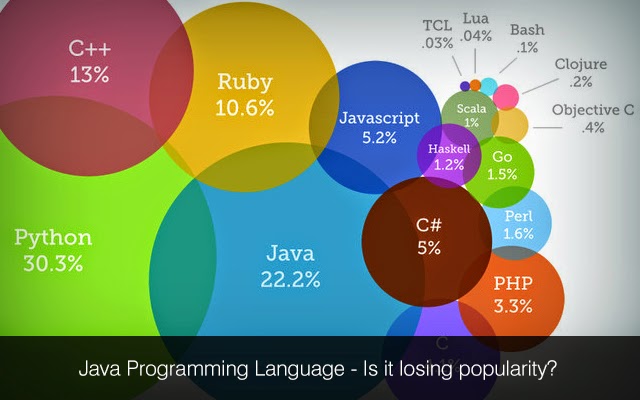Java’s
future is on the wane – this is what experts as well as surveys are
predicting about one of the world’s most popular software development
languages. It is suggested that almost around three billion devices
still run on Java. However, in the recent times, it has been at the
receiving end of the users majorly due to its security issues. However,
there are many reasons why it is preferred by the programmers during
software development. There might be trouble in deciding its future
owing to the business model promoted by Oracle but it is still a long
way before the language completely ceases to exist.
One
of the primary reasons why Java is considered useful is because it is
an impressive server side language. For implementing infrastructure
several big companies are still using it into their data centers and
then integrating them to the mainframe and all other kinds of devices.
This programming language has a well defined technology and backed by
some of the most well known software companies in the world, like,
Oracle and IBM. These companies still have a stronghold over the
software market. Moreover, people who are looking to build systems with
simple architecture definitely prefer this language. For instance, while
developing a reservation system for the railways, Java will have
complete edge over other software development languages, like, Python.
Java
is a dynamic language. This factor makes it extremely popular with the
developers who can create cross platform applications with it. There are
end numbers of open source frameworks on which it can work efficiently
as well as smoothly. In addition to this, Java is not only a language
but it is also a platform. It is a perfect platform on which dynamic
languages like Scala, Goovy and Ruby could easily run. Thus, if the
programmers want to include dynamic languages in the infrastructure, now
they can do it without a worry. The popularity of the handheld devices
is also adding to the usability of Java. For the back-end applications,
this is irreplaceable. The Android systems support Java and there is no
escape from it when it comes to your smartphones. As a browser plugin,
it might have lost its place but it is essential when it comes to
Android development.
So
what are the reasons for losing its popularity? Well, there are several
reasons that are working against this software development language. In
a world where technology is constantly being updated, Java does not
receive frequent updates. Users do not update it even after the release
of a new version. In more corporate set-up, the system admin might
update but this rule does not apply for individual user devices.
Secondly,
departing from Sun Microsystems also proved detrimental for the
language. At Oracle there is lesser number of breakthrough and
innovative technologies. The company has been struggling visibly with
providing swift updates and fighting the security vulnerabilities. These
problems occur when there is stagnation and not much has changed in
this language since 2010. While it is lagging behind without new and
innovative features, a host of new languages are ready to take its
place. Python, C++, C#, Ruby and many more are gradually capturing the
software development market with developers preferring the new versions
over the older models.
Java
did lose a significant number of followers in the past but to say it
has completely lost its place would be an exaggeration. Rather, with the
dominance of the cell phone usage, it has found its lost ground to a
large extent. Google’s choice has provided a new lease of life to the
waning popularity of Java. In addition to this, Oracle is putting in all
the efforts to pep it up with new versions and other important
releases. To conclude, it is still here to stay. You can get in touch
with Java web application development companies who can help you develop web apps that are stable, scalable and secure.
We provide Java web development services. If you would like to hire Java developers India for your development needs, please contact us Mindfire Solutions.

